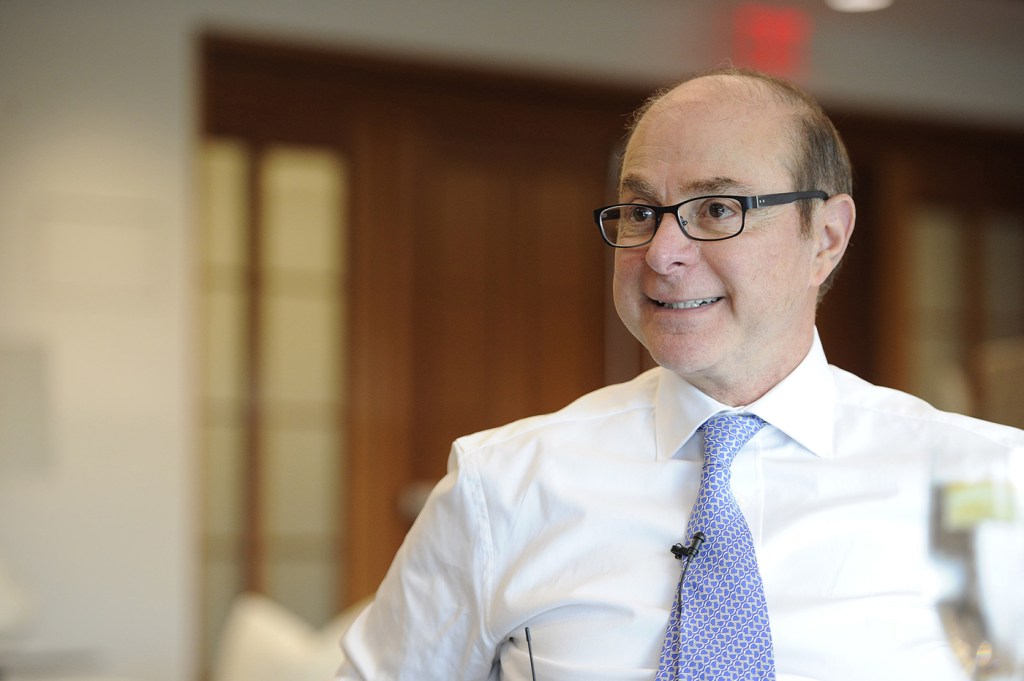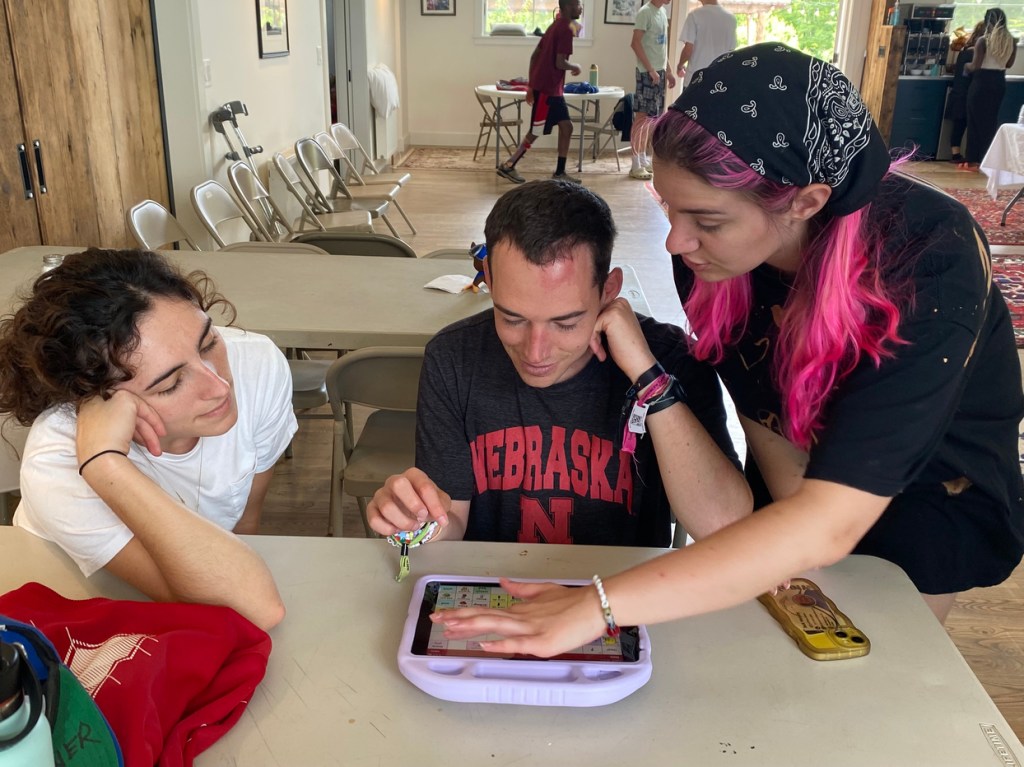A conversation with President Aoun Part 2

We sat down with President Aoun for a conversation about a wide range of topics. The first part of the discussion focused on his personal journey. In this installment, we delve into his priorities here at Northeastern.
What is your proudest accomplishment from the last year?
The university is maturing and the sign of maturation is that people are taking charge of the destiny of the institution. You have students who are achieving a lot internally, externally, and making an impact. You have students being recognized—the Rhodes Scholar is an example, Fulbrights, Marshalls, et cetera. You have incredible breakthroughs in terms of research that the faculty are leading. Ultimately what is good about all of that is that the president is no longer at the center stage. The administration is no longer at the center stage because the community is owning it, is leading it, and is making it happen.
You often talk about the importance of charting your own path. You say that about yourself and about this institution. Why is that so important?
[inlinetweet prefix=”.@PresidentAoun:” tweeter=”” suffix=””]It is a liberating endeavor to chart your own path.[/inlinetweet] You don’t look to your right; you don’t look to your left. You look at your aspiration; you look at impact. You are freeing yourself from boundaries and you are creating, you are innovating. Every person has the power to innovate and the community as a whole has the power to innovate. I see the students launching IDEA or Mosaic. All of these organizations are based on creativity and innovation. That’s why it’s so important to chart your own path. If you chart your own path as a community, the sky is the limit.

Northeastern is a place of fast change and robust innovation. What do you not want to see change?
First and foremost, co-op. But why? [inlinetweet prefix=”.@PresidentAoun:” tweeter=”” suffix=””]Co-op forces us to be in tune with reality.[/inlinetweet] Co-op is a constant humbling experience for the students, for the faculty, for the staff because it reminds us that the world is changing—that we cannot be observers only, but we have to be actors. And so when the students come back from co-op, they are challenging us because they challenged themselves. They are challenging our knowledge. They are challenging our assumptions. That’s powerful. I love it; I don’t want that to change at all. Co-op is a window to the world; co-op gets you active in the world, gets you to shape the world and to shape yourself.
Northeastern is a remarkably global institution. In the past 10 years we have expanded to 131 countries, all over the globe, through our experiential learning programs. What’s next?
We are never global enough. No one is global enough. We have expanded in terms of the Dialogue of Civilizations; we have expanded in terms of our overseas activities; we have expanded in terms of co-op. But it’s never enough. [inlinetweet prefix=”.@PresidentAoun:” tweeter=”” suffix=””]The ultimate goal is for every student leaving Northeastern to have a global experience.[/inlinetweet] We’re not there, yet.
How does living and learning in a diverse community impact one’s worldview?
[inlinetweet prefix=”.@PresidentAoun:” tweeter=”” suffix=””]Diversity is a humbling experience.[/inlinetweet] It has depth that you don’t understand until you live them in different contexts, or in contexts different from yours. That is the power of living, working in different cultures, in different communities— because you have to be in a listening mode and you have to be not only listening, but also respecting. And you have to also decide what is unacceptable. So if you see something that’s not fair, no matter what culture you are in, you push to react by definition. So, diversity—living in different environments, in different contexts, in different communities—forces you to be the newcomer and forces you to try to understand, try to respect, and try to at least start to question what you have. That’s a beauty.
You spoke out about a recently passed law in North Carolina that limits the use of public bathrooms based on born gender. Why is it important to you to speak out when you see something happening elsewhere, outside of the Northeastern community?
Diversity is not a slogan. Diversity is something that we have to live. We are a diverse community and we seek to be even more diverse. When you see that some people are pushing back against that, you have to speak out because otherwise what you are doing inside a campus or inside a community will have no meaning if it doesn’t spill over and take over the whole world. That’s why. [inlinetweet prefix=”.@PresidentAoun:” tweeter=”” suffix=””]We have a responsibility to live diversity, to push for diversity, and to speak out[/inlinetweet] against those trying to limit diversity.

The Chronicle of Higher Education wrote a big feature about the rise of Northeastern as a major research institution. How did we do it and what other new research areas should we be betting on moving forward?
The reason research has been successful here in our community is because the research we decided to focus on is research that has an impact—that is trying to provide solutions to the global challenges of health, security, and sustainability. So they are not random decisions that we made. The community said, “Our research needs to be meaningful and needs to have an impact,” and sometimes you hear the term “use-inspired” research. So that’s why we have been successful, because this research is meeting the needs of society. So, research continues to evolve. The importance of design is rising, you know, an engineer needs design, somebody in the D’Amore-McKim School of Business needs to incorporate design. Every time we create something, design is important. Similarly, what is exciting to me is the onset of the work on experiential liberal arts, but also on experiential PhDs—and PhDs by definition feed research.
So what we are doing here is saying [inlinetweet prefix=”.@PresidentAoun:” tweeter=”” suffix=””]our whole enterprise is experiential—whether it’s teaching or learning,[/inlinetweet] they have to be experiential.
Change can be scary or can be exhilarating. It’s scary if it’s going to question the essence of the place. It’s exhilarating if it’s going to reinforce the essence of the institution and the community.
Northeastern is the recognized leader in co-op and experiential learning, but many other institutions are emulating our success. How do we maintain our edge?
It’s a great point because [inlinetweet prefix=”.@PresidentAoun:” tweeter=”” suffix=””]leadership is not given once and for all.[/inlinetweet] We are the leaders in experiential education and we have to further that.
We are looking at the notion of experiential liberal arts. We are working with our faculty colleagues on that. Similarly, we are developing online experiential degree programs. And I mentioned to you that we are seeing the onset of experiential PhD programs.
All of that gives us an edge because no one, no institution, is looking at it in a comprehensive way. They are looking at experiential education at the undergraduate level and, frankly, they are not integrating it yet. So the second aspect, in terms of maintaining our leadership, is to become not only the best practitioners but also the thought leaders. Showing that this model is superior to other models where you are confining your education, essentially, to the classrooms. That’s also the efforts being led by our community and Susan Ambrose and her team.
You always look at finding new venues to think and rethink what you are doing. Similarly, our global experiential strategy is very impactful. We have a lead, but we have to further it. Nothing is given forever. Your leadership is not a right. [inlinetweet prefix=”.@PresidentAoun:” tweeter=”” suffix=””]Our leadership is due to our practice, our creativity, our thinking, and our questioning.[/inlinetweet]
Listen to selected clips from the interview with President Aoun:
President Aoun: “The university is maturing”
President Aoun: “Liberating endeavor to chart your own path”
President Aoun: “Co-op forces us to be in tune with reality”
President Aoun: “We are never global enough”
President Aoun: “Diversity is a humbling experience”
President Aoun: “Diversity is not a slogan”
President Aoun: “Our research needs to be meaningful and needs to have an impact”
President Aoun: “Change can be scary”
President Aoun: “Leadership is not given”





